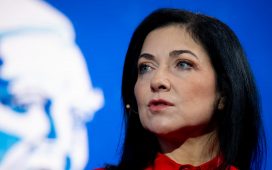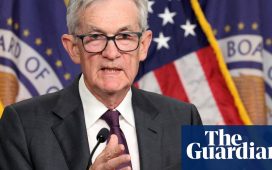Poor Rachel Reeves. The economy is weak. Government borrowing has just come in higher than expected. The International Monetary Fund (IMF) has downgraded its forecasts for UK growth. And to cap it all, she is trying to get the arch-protectionist Donald Trump to lower tariffs on British exports as part of a UK-US trade deal. Being chancellor of the exchequer is a tough gig, but nobody told her it would be this tough.
Reeves is in Washington this week for the half-yearly meetings of the IMF and the World Bank and there is no shortage of problems that the two venerable institutions could be getting their teeth into. There is a need for speedier and deeper debt relief to allow poor countries to spend more on tackling climate change. There is a need to redouble international efforts to hit the 2030 development goals set by the United Nations. There is a need to change the way the fund and the bank are managed to reflect the fact that the global economy has moved on since they were created in 1944.
Inevitably, though, the meetings have been overshadowed by the increasingly unhinged antics of Trump. This week began with the president taking aim at Jerome Powell after the man in charge of America’s central bank said tariffs would push up US inflation and make it harder for the Federal Reserve to cut interest rates. Trump called Powell a “major loser” and triggered panic in the markets by suggesting his reluctance to reduce borrowing costs meant he was for the chop.
This was more than a run-of-the mill wobble in the stock market. Instead, there was the unusual combination of US share prices, US bonds and the US dollar all falling at the same time. Normally when share prices tumble bond prices go up, while nervous investors pile into the dollar. Faced with the prospect that the US currency might no longer be considered a safe haven, Trump was forced to backtrack, saying he never had any intention of sacking Powell. But nobody can be sure. Trump is vindictive and will need a scapegoat when his policies backfire. According to the IMF, the US will take the biggest hit from tariffs of any major economy, but was perhaps also being a little generous in predicting growth this year of close to 2%. It could be a lot worse than that.
Let’s be clear. Some of Trump’s criticisms of the way the global economy has been managed – or rather mismanaged – are warranted. There is an argument for the use of protectionism as part of an industrial strategy. There is an argument for reform of the way the IMF and World Bank operate. And there is certainly a case for taking a long, hard look at whether central bank independence should be taken as given.
Powell and the Fed deserve criticism for some of the decisions they have taken in recent years, particularly in the period after the pandemic when policy was initially too lax and then too tight. The same applies to the Bank of England. The golden period of central bank independence came in the 1990s when the arrival of cheap goods from China kept inflation low. Central banks took the credit but they just got lucky.
What’s more, the idea that independent central banks are truly independent is questionable. Voters have been sold the idea that control of interest rates should be handed to supposedly apolitical technocrats who will not be tempted to tweak policy for short-term electoral gain and can therefore be better trusted than elected representatives to make policy in a rational manner.
But more often than not these “rational” decisions reflect the prejudices of central bankers, not least that keeping inflation low is the only thing that really matters. One of Powell’s predecessors – Paul Volcker – crushed inflation in the early 1980s by pushing US interest rates to punitive levels. The result was a deep recession and the demise of whole communities in the American midwest. Alan Greenspan, who took over from Volcker at the Fed, would cut interest rates if there was a risk that a slump on Wall Street would become too pronounced. These were deeply political decisions taken with full knowledge of the consequences, one of which is strong support for Trump in the rust belt.
But Trump’s personal attacks on Powell have the paradoxical effect of making the Fed’s independence more secure. As was the case with tariffs, the president has found it is impossible to buck the markets. Yet the notion that things will be calmer now is for the birds. Trump is an unstable bully who just happens to be in charge of the world’s most important economy. He is likely to lash out as things get worse – as they will.
All of which brings us back to Reeves. What Britain wants out of a trade deal is clear. It would like to be exempt from Trump’s across-the-board 10% tariff imposed on all countries, and to see a cut – preferably to zero – in the 25% levy on car exports to the US. The US wants easier access for its food exports, including chlorine-washed chicken, something the UK considers a red line.
This would be a tricky negotiation at the best of times but the brutal truth is that nobody can predict what Trump will do or say from one moment to the next. There will be other casualties of his wrecking-ball approach. The UK could be one of them.







